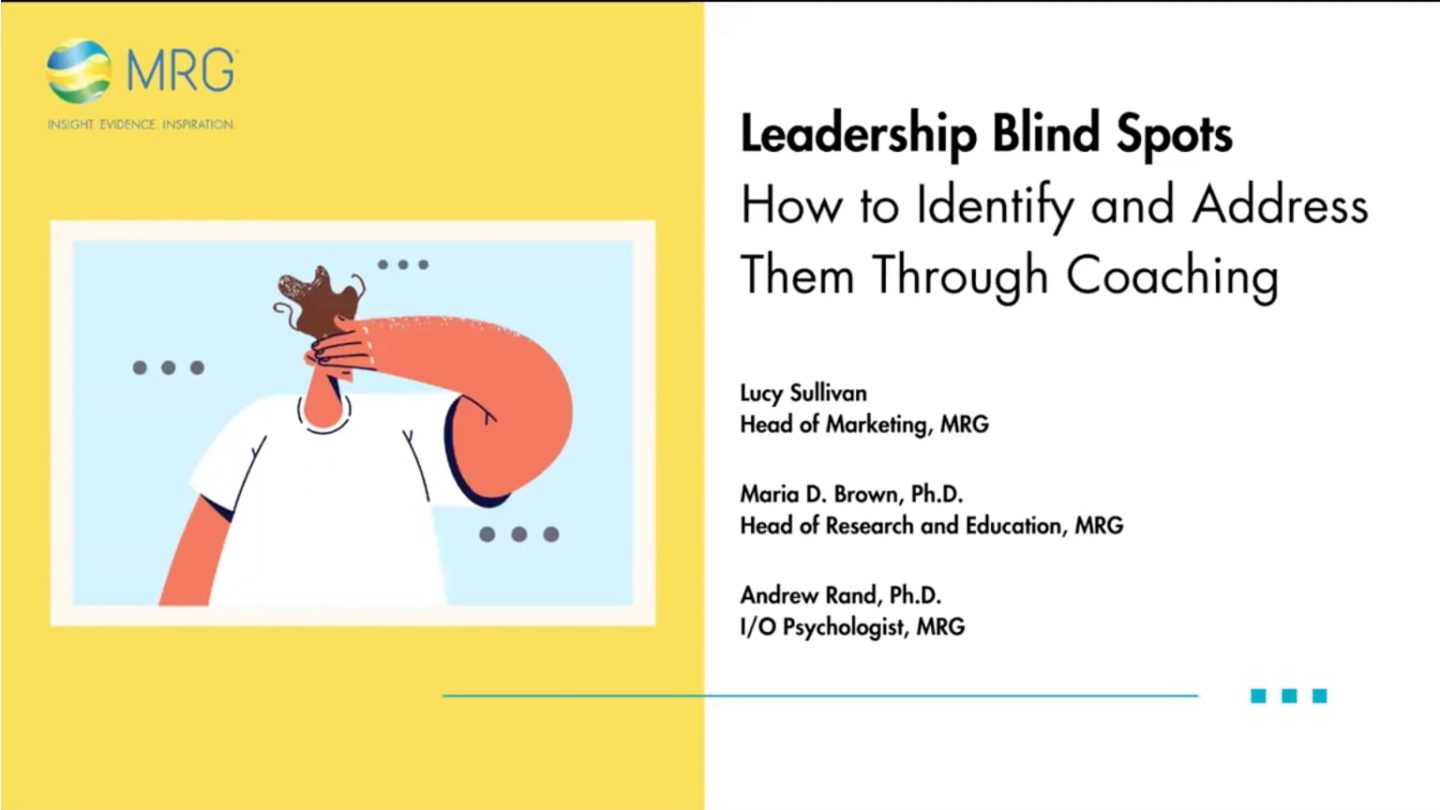Leadership Blind Spots: How to Identify and Address Them through Coaching

Even the most capable leaders have blind spots — areas of behavior or perception that limit their effectiveness, often without their awareness. These leadership blind spots can undermine influence, erode trust, and hold back both individual and organizational performance.
At MRG, we’ve spent decades studying what drives leadership success — and what gets in the way. Our research shows that the difference between good leaders and great ones often comes down to one key factor: self-awareness. Coaching that helps uncover and address leadership blind spots can transform how leaders think, decide, and engage with others.
What Are Leadership Blind Spots?
Leadership blind spots are the gaps between a leader’s intentions and the impact they actually have. They’re often patterns of behavior, attitudes, or assumptions that leaders don’t fully recognize — yet others around them experience every day.
Blind spots can appear in many forms:
- Over-reliance on strengths that become liabilities under pressure
- Difficulty adapting communication style to different audiences
- Avoidance of conflict or feedback
- Limited awareness of how decisions affect others
- Unrecognized biases that shape hiring, delegation, or recognition
These patterns don’t emerge from weakness — they come from habit, success, and human nature. The more senior a leader becomes, the fewer people are willing to provide candid feedback, and the easier it is for blind spots to persist.
Why Leadership Blind Spots Matter
Unchecked, blind spots can ripple across teams and cultures. They can lower engagement, slow decision-making, and block innovation. Leaders who lack awareness of how they’re perceived risk losing trust — and trust is the foundation of effective leadership.
Research conducted through MRG’s global assessment database shows that high-performing leaders consistently demonstrate a strong ability to see themselves clearly and adjust their behavior based on context and feedback. Those who fail to recognize blind spots are far more likely to derail, especially during times of change or increased complexity.
The Role of Coaching in Uncovering Blind Spots
Coaching provides a structured and psychologically safe space for leaders to explore their impact. It’s not about criticism — it’s about discovery.
Through coaching for self-awareness, leaders gain insight into how their natural tendencies shape relationships, results, and culture. This awareness becomes the foundation for behavioral change and growth.
At MRG, we help coaches and organizations bring objectivity to this process through data-driven insights. Tools like the Leadership Effectiveness Analysis™ (LEA 360) reveal how leaders perceive themselves — and how others experience their leadership. The Individual Directions Inventory™ (IDI) uncovers the motivational drivers behind those behaviors, helping explain why certain patterns persist.
When combined, these assessments turn abstract feedback into actionable insight, allowing leaders to address blind spots with clarity and purpose.
Five Common Leadership Blind Spots — and How Coaching Helps
Overconfidence in Communication:
Leaders may believe they’re clear and transparent, while their teams experience confusion or mixed messages. Coaching helps leaders practice active listening, adapt their tone, and validate understanding.
Overuse of Strengths:
A decisive leader may come across as domineering. A collaborative leader may hesitate to act without consensus. Coaching builds awareness of when strengths become overused and how to balance them with situational needs.
Avoidance of Conflict:
Many leaders undervalue constructive tension. Coaching helps them view disagreement as a path to innovation, not a threat to harmony.
Lack of Perspective:
Some leaders assume their team shares the same priorities or context. Assessments and reflection exercises expose these gaps and help leaders align perception with intent.
Emotional Blind Spots:
Leaders who fail to recognize their own stress responses or emotional triggers can unintentionally transmit anxiety to others. Coaching increases emotional regulation and relational awareness.
Turning Awareness into Action
Awareness alone doesn’t eliminate blind spots — but it opens the door to meaningful change. Through guided coaching and reflection, leaders can translate feedback into daily practices that strengthen relationships and performance.
Effective coaching includes:
- Objective insight: Using assessments like LEA 360™ and IDI™ to illuminate unseen patterns.
- Reflective dialogue: Encouraging leaders to explore reactions, assumptions, and motivations.
- Behavioral experiments: Testing new approaches and gathering feedback on impact.
- Sustainable integration: Building structures — peer feedback, accountability partners, development plans — that reinforce new habits.
Over time, this process not only reduces blind spots but also expands a leader’s range — the ability to flex behaviors intentionally based on context and need.
From Blind Spots to Breakthroughs
When leaders address blind spots, the effects reach far beyond individual performance. Teams experience clearer communication, higher trust, and stronger alignment. Organizations see improved engagement, faster decision-making, and more agile leadership pipelines.
As Tricia Naddaff, MRG’s President, explains:
“Blind spots aren’t flaws — they’re opportunities. When leaders have the courage to see themselves fully, they gain the freedom to grow intentionally.”
How MRG Supports Coaches and Organizations
MRG’s research-based assessments provide the foundation for uncovering leadership blind spots with precision and objectivity. By integrating behavioral and motivational data, coaches and organizations can:
- Pinpoint specific development opportunities that matter most
- Engage leaders in deeper, evidence-based self-reflection
- Align coaching goals with organizational strategy and culture
- Track progress over time with measurable outcomes
For over 40 years, MRG has helped leaders transform awareness into action — turning blind spots into breakthroughs that drive sustainable success.
Final Thought
Addressing leadership blind spots isn’t about perfection — it’s about progress. The most effective leaders continuously seek to understand how they’re perceived, adapt their approach, and learn from experience.
When coaching is grounded in data and delivered with empathy, it becomes one of the most powerful tools for developing leaders who are self-aware, adaptable, and authentically effective.